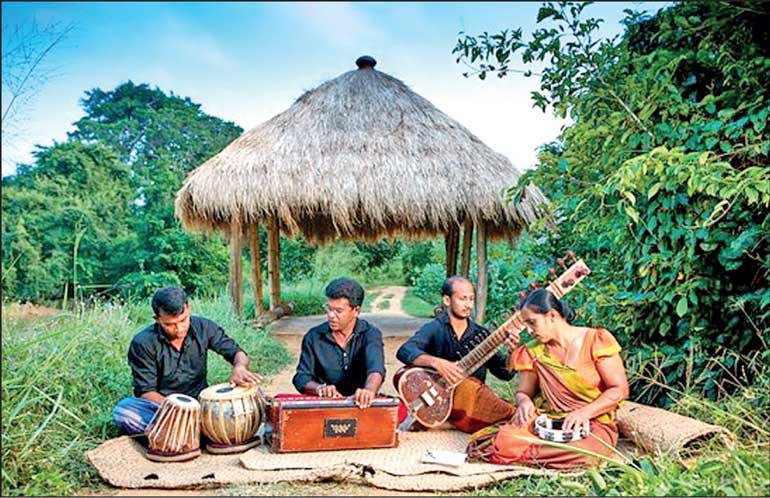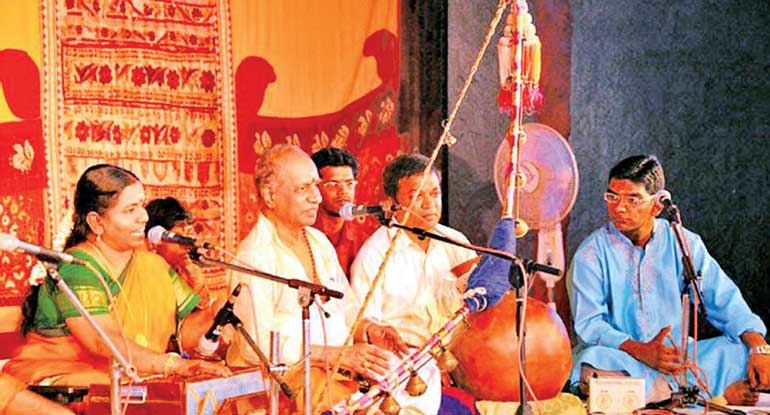Tuesday Feb 24, 2026
Tuesday Feb 24, 2026
Saturday, 7 October 2023 00:00 - - {{hitsCtrl.values.hits}}
 Pic courtesy www.tripadvisor.com
Pic courtesy www.tripadvisor.com
By Surya Vishwa
The combination of different sounds, rhythms, and emotions can be defined as music. Research on the impact of music on the human anatomy is known to point to an increase in oxytocin and beta-endorphins. This, amongst other findings, has enabled music to be mainstreamed in medical fields recording stellar success ranging from psychological, physiological, and emotional to various health issues. This shows that music propels the human mind to a higher untethered consciousness that enables it to free itself from limitations.
Among man’s main limitations is seeing separateness of the others based on differences of skin color, culture, religion, race, class, wealth, ethnicity, or caste. Music once again comes to the forefront to bring different identities to one platform. Being the embodiment of core human expression, it creates harmony through dialogues bringing different ethnicities, cultures, religions, classes, or any other borders together.
With the goal of celebrating both the scholarly and inspirational value of music and dance, the Department of Fine Arts of the University of Kelaniya is organising the12th Symposium of the ICTMD (International Council for Traditions of Music and Dance) Study Group on Music and Minorities with a joint day with the ICTM Study Group on Indigenous Music and Dance. It is a major international event with over 60 scholars from around the world including Sri Lankans representing various universities within the country.
The International Council for Traditions of Music and Dance (ICTMD) is a scholarly organization that aims to further the study, practice, documentation, and preservation of traditional music and dance in all countries. As an NGO in formal consultative relations with UNESCO and by means of its wide international representation and the activities of its Study Groups, the International Council for Traditions of Music and Dance acts as a bond among peoples of different cultures and thus contributes to the peace of humankind.
The Study Group on Music and Minorities is a biennial event taking place in different countries. This year it is celebrated in Sri Lanka in a bid to bridge the scholarly world of music with the practice as well as contribute to the national tourism and economic paradigm. It will be a hybrid symposium with a rich program planned from 4-9 December 2023.
The opening ceremony will be on 4 December at the University of Kelaniya followed by four full symposium days at the Sri Lanka Tourism Promotion Bureau auditorium from 05-08 December.
The Opening ceremony at the University will be elaborated with music and dance performances by children with special needs, Kaffir Afro-Portuguese descendants from Sirambiadiya, Puttalam, Sri Lankan Muslim, Malay, Indian, and Sri Lankan Tamil, Sufi music performers apart from the students of the Department of Fine Arts of the University of Kelaniya.

Highlights of the event will be a post-symposium excursion to the Vedda, an indigenous community in Dambana on 9 December 2023 will allow foreign scholars and researchers to get firsthand experiences on rich cultural practices, music, and dance of the Sri Lankan indigenous people.
The chair of the local arrangements committee of the event, and the national representative of the ICTMD scholarly organization, Dr. K. D. Lasanthi Manaranjanie, and the colleagues of the Department of Fine Arts of the University of Kelaniya are planning well to bring this international event to a highlight of the University.
Dr. Lasanthi Manaranjanie holds a Doctorate in Musicology from the Department of Musicology of the University of Ljubljana in Slovenia. She has been affiliated with the International Council for Traditions of Music and Dance since 2007.
Speaking of the event in December she explained that this scholarly and culturally important symposium event provides an extraordinary opportunity for international exposure of Sri Lanka. She further explains that this exposure has many aspects including the promotion of Sri Lanka as a cultural and aesthetic tourism destination which has macro-economic impact and the showcasing of Sri Lanka's indigenous, and music and dance of minority communities. This will enable future collaborations with various Sri Lankan and foreign institutions for innovative solutions for a better world through arts.
Dr. Lasanthi added that the biggest challenge to the event is the struggle to find adequate sponsorships to cover all the costs involved. She is grateful to the Sri Lanka Tourism Promotion Bureau and the Sri Lanka Convention Bureau for their full support in hosting this scholarly gathering at the SLTPB auditorium which covers the major cost. The Department of Cultural Affairs, Hemas Holdings Plc, Australian Guild of Music Speech Sri Lanka and Barbara Segal Opera International, People’s Bank are the others who are supporting the Department of Fine Arts of the University of Kelaniya financially and materially. There are still many costs involved in facilitating the minority music groups to perform at the event, she points out.
“We are determined to do our best to make this symposium which gives exposure to Sri Lanka. We call upon all tourism-linked organisations to consider supporting this event,” says Dr. Lasanthi Manaranjanie.
“This is the first time this event is held in Sri Lanka and we embarked on planning it despite the economic crisis in order to pitch our country in a positive light to possible investors and tourists, as the nation hopes to get back on its feet,” she explained.
For inquiries about supporting the event following is the direct symposium web link: https://hu.kln.ac.lk/depts/visual_performing/index.php/ictmd-symposium
The Weekend FT Harmony Page is supporting the event as part of its mission to mainstream all forms of arts, crafts, and traditional knowledge into the national economic structure and bilateral trade as well as diplomacy.
A detailed Q & A with Dr. Lasanthi Manaranjanie will be featured in our upcoming editions featuring music as forms of bilateral relations enhancing global diplomacy, world peace, and the need to mainstream art and artists into the economic mainstream. The upcoming interview will cover what Sri Lanka can learn about music education trends in the world and how music is used in diverse sectors, especially the health sector.
Regarding queries about supporting the upcoming Symposium of the ICTMD, Dr. Lasanthi Manaranjanie can be contacted at [email protected]